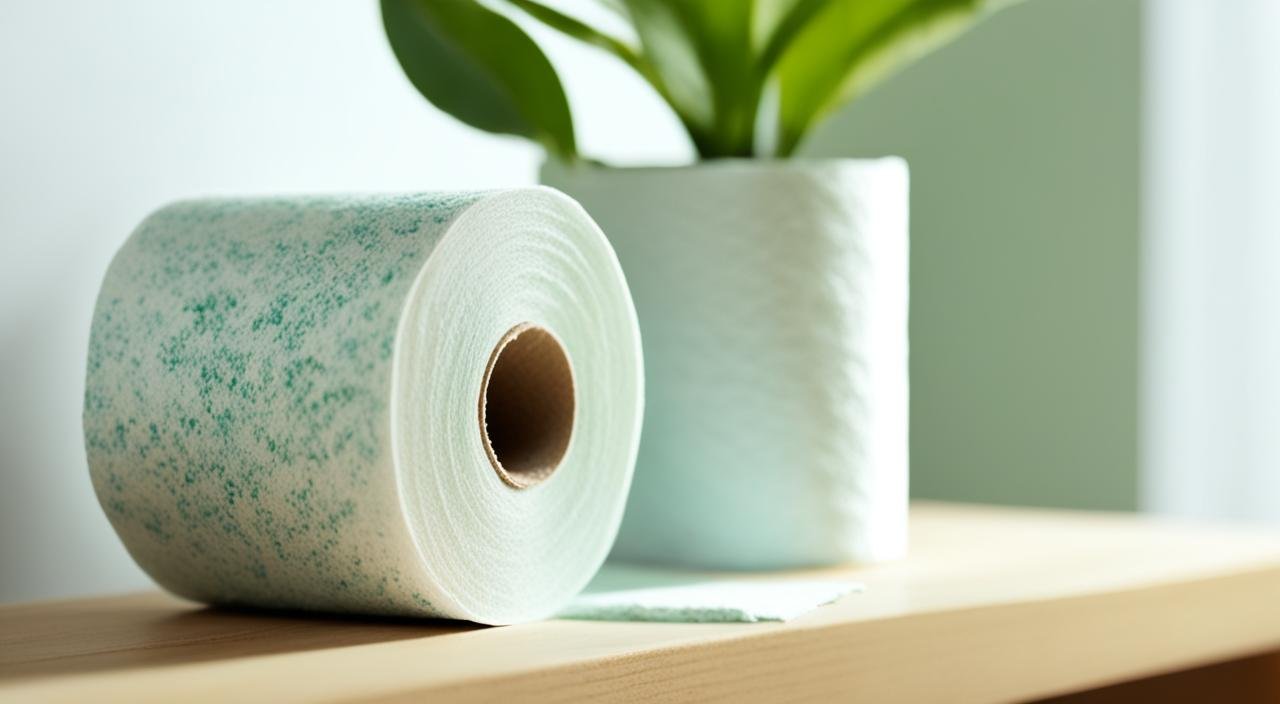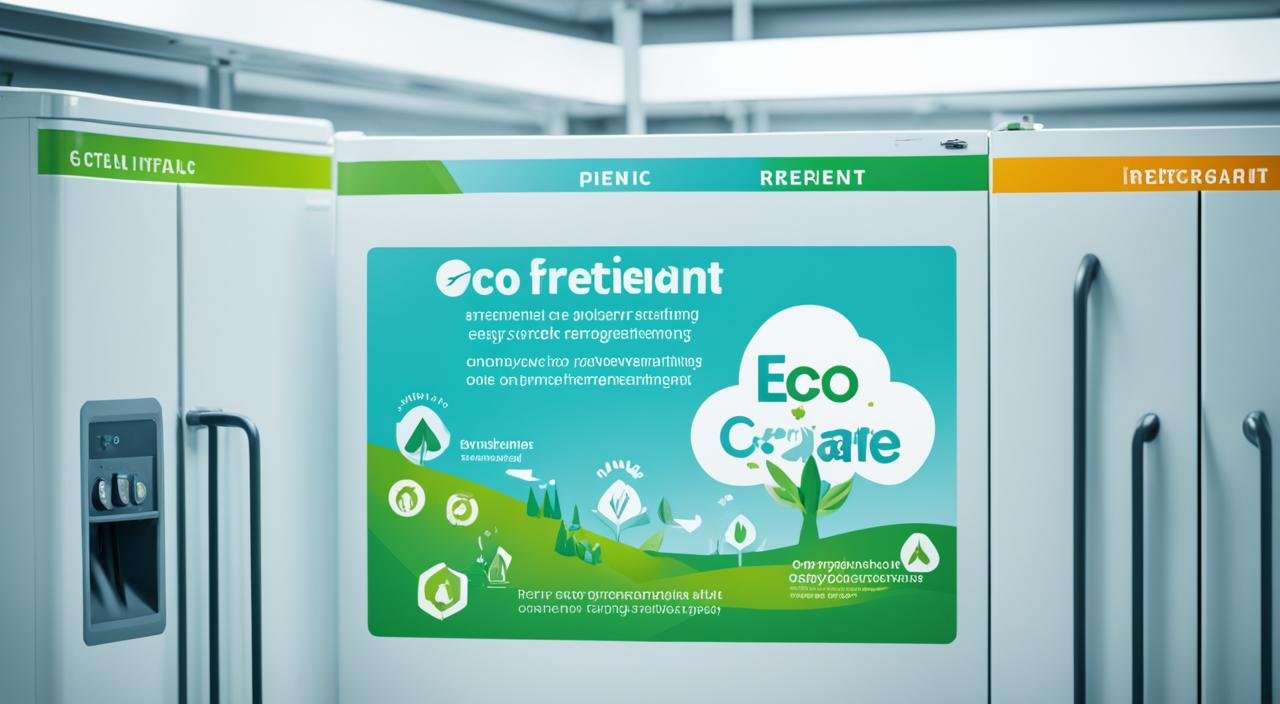Toilet paper is an essential item in every bathroom, but its production often leads to deforestation and environmental degradation. However, there are eco-friendly alternatives available on the market that offer sustainable and environmentally conscious options. From recycled paper to bamboo and plastic-free choices, there are plenty of options to help you make a green and gentle choice for your bathroom routine.
We have researched and tested the best eco-friendly toilet paper options to provide you with the information you need to make a sustainable decision. In this article, we will discuss the benefits of eco-friendly toilet paper, top picks from trusted brands, water-saving toilet options, organic and chemical-free alternatives, reusable and zero-waste options, and more. By the end of this article, you’ll be equipped with the knowledge to choose the right eco-friendly toilet paper for your needs.
Key Takeaways:
- Eco-friendly toilet paper helps prevent deforestation and reduces the carbon footprint associated with production.
- Green toilet roll options are made from sustainable materials such as bamboo and recycled paper, making them biodegradable and gentle on the skin.
- Top picks for eco-friendly toilet paper include Betterway, Cloud Paper, Caboo Bamboo, and Who Gives a Crap.
- Combining water-saving toilets with compostable toilet paper promotes sustainability in the bathroom.
- Organic and chemical-free options like Red Label by Renova and Tushy prioritize natural and environmentally friendly materials.
The Benefits of Eco-Friendly Toilet Paper
Eco-friendly toilet paper offers a range of benefits that make it a sustainable and responsible choice for your bathroom routine. By opting for green toilet roll, biodegradable toilet tissue, or eco-friendly bamboo TP, you can contribute to environmental preservation, reduce your carbon footprint, and prioritize your skin’s well-being.
Preventing Deforestation and Reducing Carbon Footprint
One of the major advantages of eco-friendly toilet paper is its role in preventing deforestation. Conventional toilet paper production involves sourcing virgin wood pulp, contributing to habitat destruction and the depletion of natural resources. In contrast, green toilet roll options are made from sustainable materials like recycled paper or bamboo, which helps conserve forests and preserves natural habitats.
Additionally, eco-friendly toilet paper reduces the carbon footprint associated with production and sourcing. The manufacturing process of traditional toilet paper requires significant energy and emits greenhouse gases. By choosing biodegradable toilet tissue made from sustainable sources, you can minimize the environmental impact and promote eco-conscious practices.
Gentle on the Skin
Eco-friendly toilet paper is not only good for the planet but also gentle on your skin. These products are free from chemicals, dyes, and fragrances that may cause irritation or allergies. By opting for biodegradable toilet tissue, you can reduce the risk of skin sensitivity and ensure a safe and comfortable experience with every use.
To further highlight the benefits of eco-friendly toilet paper, consider the following:
- Green toilet roll options are biodegradable and environmentally friendly.
- They are made from sustainable materials such as bamboo and recycled paper.
- These products are free from chemicals, dyes, and fragrances.
To illustrate the importance of eco-friendly toilet paper, here’s a relevant quote:
“By choosing eco-friendly toilet paper, we not only contribute to a greener planet but also create a sustainable future for generations to come.” – Sustainable Living Magazine
Choosing eco-friendly toilet paper is a conscious decision that aligns with your values and supports a healthier planet. By minimizing your impact on the environment and promoting sustainability, you can make a positive difference with every roll you use.
Top Picks for Eco-Friendly Toilet Paper
When it comes to choosing earth-friendly toilet paper, there are several top picks available on the market. These brands prioritize sustainability and offer options that are gentle on the environment without compromising quality. Here are our top recommendations for recycled and sustainable toilet tissue:
Betterway Bamboo Toilet Paper
Betterway offers a premium bamboo toilet paper that is not only soft and absorbent but also environmentally conscious. The bamboo pulp used in their toilet paper is sourced from FSC Certified bamboo, ensuring responsible forestry practices. With Betterway, you can enjoy a luxurious bathroom experience while making a positive impact on the planet.
Cloud Paper Plastic-Free Bamboo Toilet Paper
Cloud Paper is committed to providing eco-friendly alternatives to conventional toilet paper. Their plastic-free bamboo toilet paper is septic-safe and comes in long-lasting rolls, reducing waste and minimizing your carbon footprint. With Cloud Paper, you can make a sustainable choice without compromising on quality or convenience.
Caboo Bamboo Toilet Paper
Caboo is dedicated to promoting sustainability and waste reduction. Their bamboo toilet paper is made from sustainably-grown bamboo and bagasse sugar cane, offering a renewable and earth-friendly alternative to traditional toilet tissue. By choosing Caboo, you can support sustainable agriculture and contribute to a greener future.
Who Gives a Crap Recycled Toilet Paper
Who Gives a Crap is a brand with a philanthropic mission. Not only is their toilet paper made from 100% recycled paper, but they also donate 50% of their profits to building toilets in communities in need. By purchasing Who Gives a Crap toilet paper, you can make a positive impact on both the environment and the lives of those less fortunate.
Eco-friendly toilet paper options are now more accessible than ever. From recycled toilet paper to bamboo alternatives, there is a sustainable choice for every eco-conscious consumer. Consider these top picks when making your next purchase and take a step towards a greener bathroom routine.
Water-Saving Toilets and Eco-Friendly Toilet Paper
When it comes to sustainability in the bathroom, using water-saving toilets in combination with eco-friendly toilet paper can make a significant impact. By choosing water-saving toilets, you can conserve water and reduce your household’s overall water consumption. Pairing these toilets with compostable toilet paper further enhances your environmentally conscious efforts.
The Benefits of Water-Saving Toilets
Water-saving toilets, also known as low-flow or high-efficiency toilets, are designed to use less water per flush compared to traditional toilets. These toilets typically use around 1.28 gallons (4.8 liters) per flush, whereas older models can use as much as 3.5 to 7 gallons (13.2 to 26.5 liters) per flush. Not only do water-saving toilets help conserve water, but they also reduce the strain on wastewater systems by minimizing the volume of water entering sewer systems.
By using water-saving toilets, you can:
- Reduce water usage and lower your household’s water bills
- Conserve a precious natural resource
- Promote sustainable water management
Compostable Toilet Paper for Sustainable Waste Management
Compostable toilet paper, such as Seventh Generation 100% Recycled 1-Ply, is an excellent choice for use with composting toilets. This type of toilet paper is specifically designed to break down quickly and efficiently in composting systems. It is typically thin and free from chlorine and other chemicals that may hinder the composting process.
When using compostable toilet paper, it’s crucial to follow proper composting guidelines and ensure that the composting system reaches the necessary temperatures for effective decomposition. The resulting compost can then be used as nutrient-rich soil for gardening and other applications.
Choosing Water-Saving Toilets and Compostable Toilet Paper: A Sustainable Combination
Pairing water-saving toilets with compostable toilet paper yields a powerful combination for a more sustainable bathroom routine. Not only are you conserving water with every flush, but you’re also reducing waste and promoting eco-friendly practices.
With water-saving toilets and compostable toilet paper, you can:
- Reduce water consumption and minimize your ecological footprint
- Promote sustainable waste management through composting
- Conserve natural resources and protect the environment
By making these small changes, you can contribute to a greener future and inspire others to adopt more sustainable bathroom practices.
| Water-Saving Toilets | Compostable Toilet Paper |
|---|---|
| Uses significantly less water per flush compared to traditional toilets | Specifically designed to break down quickly in composting systems |
| Reduces water bills and promotes sustainable water management | Thin and chlorine-free, facilitating efficient composting |
| Contributes to a greener and more eco-friendly home | Minimizes waste and supports sustainable waste management |
Organic and Chemical-Free Toilet Paper Options
For those who prioritize natural and environmentally friendly products, there are organic and chemical-free toilet paper options available. These alternatives offer a safe and gentle experience for your skin and the environment. Explore the following brands that are committed to providing sustainable and non-toxic options:
Red Label by Renova
Renova’s Red Label toilet paper is an organic choice made from 100% virgin pulp. With strict adherence to environmental standards, Renova ensures that their product is free from harmful chemicals, fragrances, and dyes. By selecting Red Label, you can confidently prioritize both your health and the well-being of the planet.
Tushy
Tushy offers unbleached, BPA-free toilet paper crafted from organic bamboo. This chemical-free option guarantees a gentle touch while reducing your ecological impact. By choosing Tushy’s organic toilet paper, you can embrace sustainability without compromising on quality.
These organic and chemical-free toilet paper choices are ideal for individuals seeking an eco-conscious bathroom routine. From Renova’s commitment to strict environmental standards to Tushy’s use of organic bamboo, you can rest assured that your toilet paper aligns with your values and promotes a healthier planet.
Reusable and Zero Waste Toilet Paper Alternatives
For those looking to reduce waste and embrace a zero waste lifestyle, reusable and zero waste toilet paper alternatives are available. By opting for these alternatives, you can minimize your environmental impact and contribute to a more sustainable future.
Organic Cotton “Toilet Unpaper” by Creekside Kid
Creekside Kid offers an innovative solution with their organic cotton reusable “toilet unpaper.” This alternative to traditional toilet paper is made from soft and durable organic cotton fabric. Simply wash and reuse these cloth wipes, eliminating the need for disposable toilet paper. By using reusable “toilet unpaper,” you can significantly reduce waste and promote a zero waste bathroom routine.
Reusable Organic Cotton Toilet Paper by As You Stitch Baby
Another excellent zero waste toilet paper alternative is provided by As You Stitch Baby. Their reusable organic cotton toilet paper offers a sustainable and eco-friendly option for your bathroom. Made from high-quality organic cotton fabric, these cloth wipes can be laundered and used again, reducing waste and promoting sustainability. With As You Stitch Baby’s reusable toilet paper, you can make a long-term commitment to reducing your ecological footprint.
If you’re unsure about using reusable toilet paper, rest assured that these alternatives are designed with hygiene in mind. They can be easily cleaned and sanitized, providing a sanitary option for your bathroom needs.
By choosing reusable and zero waste toilet paper alternatives, you join the zero waste movement and contribute to a greener future. Waste reduction and sustainable practices are essential steps towards mitigating our impact on the environment.
| Benefits of Reusable and Zero Waste Toilet Paper Alternatives | Reusable “Toilet Unpaper” by Creekside Kid | Reusable Organic Cotton Toilet Paper by As You Stitch Baby |
|---|---|---|
| Reduces waste and landfill usage | ✅ | ✅ |
| Promotes a zero waste bathroom routine | ✅ | ✅ |
| Eco-friendly and sustainable | ✅ | ✅ |
| Hygienic and easy to clean | ✅ | ✅ |
| Long-term cost savings | ✅ | ✅ |
The Importance of Bamboo in Eco-Friendly Toilet Paper
Bamboo is a key ingredient in the production of eco-friendly toilet paper, offering numerous benefits to both the environment and consumers. Unlike traditional wood fibers, bamboo is a fast-growing crop that requires significantly less land and water. This makes it a sustainable alternative for toilet paper manufacturing, reducing the strain on natural resources.
Furthermore, bamboo has a lower carbon footprint compared to other materials used in toilet paper production. As it grows, bamboo releases more oxygen into the atmosphere, contributing to cleaner air. These qualities make bamboo an ideal choice for those seeking environmentally conscious products.
Brands such as Betterway and Cloud Paper have recognized the importance of sustainable bamboo sources and have incorporated them into their toilet paper offerings. By using bamboo as the primary material, these brands support responsible forestry practices and contribute to the preservation of natural resources.
Choosing bamboo toilet paper is not only a practical choice but also an environmentally responsible one. By opting for this sustainable alternative, consumers actively support sustainable agriculture and help reduce the demand for traditional wood pulp. Make the switch to bamboo toilet paper and become part of the movement towards a more sustainable future.
Packaging and Shipping Considerations for Eco-Friendly Toilet Paper
When it comes to eco-friendly toilet paper, the sustainability journey goes beyond the product itself. Packaging and shipping also play a crucial role in minimizing the ecological impact. Many brands recognize this and are taking steps to ensure that their packaging is plastic-free and their shipping practices are climate-neutral.
Opting for toilet paper brands that prioritize plastic-free packaging helps reduce waste and pollution. Plastic-free packaging options are typically made from recyclable or compostable materials, ensuring that they can be properly disposed of without harming the environment. Brands like Betterway and Cloud Paper are leading the way by offering plastic-free packaging options.
Besides packaging, shipping practices also contribute to the overall sustainability of eco-friendly toilet paper. Climate-neutral shipping is a key consideration for brands committed to reducing their carbon footprint. This involves offsetting the carbon emissions generated during transportation through investments in renewable energy projects or reforestation initiatives.
By choosing eco-friendly toilet paper brands that prioritize plastic-free packaging and climate-neutral shipping, you can have a greater positive impact on the environment. Not only will you be reducing your own waste and carbon footprint, but you’ll also be supporting brands that are striving to make a difference.
Social and Environmental Initiatives by Eco-Friendly Toilet Paper Brands
While sustainability is a key focus for eco-friendly toilet paper brands, many companies go above and beyond by supporting social and environmental initiatives. These philanthropic toilet paper brands use their profits to make a positive impact on communities in need and contribute to environmental nonprofits.
One such brand is Who Gives a Crap, which donates a significant portion of their profits to building toilets in communities without access to proper sanitation facilities. By purchasing their products, customers not only make a sustainable choice for the environment but also help improve sanitation conditions for those less fortunate.
Cloud Paper is another eco-friendly toilet paper brand that has shown its commitment to helping others. During the pandemic, they donated thousands of rolls of toilet paper to homeless shelters, providing a basic necessity to those experiencing homelessness.
By choosing these philanthropic toilet paper brands, consumers can be confident that their purchase is making a difference. Supporting these brands not only promotes sustainability but also contributes to positive social change and empowers environmental nonprofits.
| Brand | Initiative |
|---|---|
| Who Gives a Crap | Donates profits to building toilets in communities in need |
| Cloud Paper | Donated thousands of toilet paper rolls to homeless shelters |
Considerations for Choosing the Right Eco-Friendly Toilet Paper
When it comes to choosing eco-friendly toilet paper, there are several important factors to consider. By taking into account these sustainable toilet paper factors and embracing eco-conscious purchasing practices, you can make a positive impact on the environment and support brands that prioritize sustainability.
Certifications and Responsible Sourcing
One of the key considerations when choosing eco-friendly toilet paper is to look for certifications that ensure responsible sourcing and production practices. Certifications such as the Forest Stewardship Council (FSC) and Rainforest Alliance provide reassurance that the toilet paper you choose has been manufactured in an environmentally sustainable manner.
Material and Environmental Impact
The type of material used in eco-friendly toilet paper can also have a significant impact on its sustainability. Consider options made from bamboo or recycled paper, as these materials have a lower environmental footprint compared to traditional wood fibers. Additionally, think about the cultivation and manufacturing processes associated with the material and choose brands that prioritize sustainable practices.
Packaging and Shipping Practices
Reducing waste extends beyond the toilet paper itself. Pay attention to the packaging and shipping practices of eco-friendly toilet paper brands. Opt for products that use plastic-free packaging, which is recyclable or compostable. Look for brands that also prioritize climate-neutral shipping, offsetting carbon emissions associated with transportation.
Philanthropic Initiatives
Supporting brands that go beyond sustainability and contribute to social and environmental initiatives is another important consideration. Some eco-friendly toilet paper brands, such as Who Gives a Crap, donate a portion of their profits to building toilets in communities in need. By choosing these brands, you can make a positive impact on both the environment and society.
Eco-conscious Purchasing
Finally, practicing eco-conscious purchasing means making informed decisions based on the factors mentioned above. By considering certifications, material, packaging, shipping practices, and philanthropic initiatives, you can make a conscious choice that aligns with your values and supports a more sustainable future.
Remember, small choices can add up to significant change. Every roll of eco-friendly toilet paper you purchase contributes to reducing deforestation, preserving natural resources, and promoting sustainable bathroom practices.
Take a moment to reflect on these considerations and make an eco-conscious decision the next time you purchase toilet paper for your home.
How Eco-Friendly Toilet Paper Impacts the Environment
Conventional toilet paper production has a significant environmental impact, contributing to deforestation and habitat destruction. The demand for virgin wood pulp used in the manufacturing process leads to massive logging operations, resulting in the loss of biodiverse forests and disrupting ecosystems. The environmental consequences of deforestation include soil erosion, loss of wildlife habitats, and increased greenhouse gas emissions.
However, choosing eco-friendly toilet paper can help reduce these negative effects. Recycled toilet paper options utilize post-consumer waste paper, reducing the need for virgin tree fibers and helping to divert waste from landfill. By opting for recycled toilet paper, you are supporting the circular economy and reducing the environmental burden.
Another sustainable alternative is bamboo toilet paper. Bamboo is a fast-growing plant that requires fewer resources to cultivate compared to trees. It can reach maturity in just a few years, making it a highly renewable resource and reducing the pressure on forests. Additionally, bamboo has a higher yield per acre than traditional hardwood trees, enabling more efficient use of land for toilet paper production.
Furthermore, bamboo’s natural properties make it an environmentally friendly material. It requires fewer pesticides and fertilizers, and its extensive root system helps prevent soil erosion and enhances water retention. Bamboo toilet paper offers a more sustainable and less impactful alternative while still providing softness and strength.
“Choosing eco-friendly toilet paper helps reduce the demand for virgin wood pulp and promotes sustainable sourcing practices.”
By opting for recycled or bamboo toilet paper, you contribute to the preservation of forests, the conservation of biodiversity, and the reduction of water and energy consumption. These choices also help minimize the release of greenhouse gas emissions associated with the manufacturing process of conventional toilet paper.
To better understand the environmental impact of different types of toilet paper, let’s take a look at a comparison table:
| Type of Toilet Paper | Environmental Impact | Sustainability Features |
|---|---|---|
| Conventional Toilet Paper | High | – Contributes to deforestation – Uses virgin wood pulp – Energy-intensive production |
| Recycled Toilet Paper | Low to Moderate | – Reduces demand for virgin wood pulp – Diverts waste from landfill – Minimizes greenhouse gas emissions |
| Bamboo Toilet Paper | Low | – Fast-growing and renewable bamboo – Requires fewer resources to cultivate – Sustainable manufacturing practices |
This table highlights the significant environmental impact of conventional toilet paper, along with the sustainability benefits of recycled and bamboo alternatives.
In conclusion, eco-friendly toilet paper choices have a positive impact on the environment by reducing deforestation, conserving water, and minimizing greenhouse gas emissions. Whether you opt for recycled toilet paper or bamboo alternatives, your decision can make a difference in preserving our natural resources and promoting a more sustainable future.
Conclusion
When it comes to maintaining a sustainable bathroom routine, eco-friendly toilet paper choices play a crucial role. With a wide range of options available, including recycled paper and bamboo alternatives, you have the power to make a positive impact on the environment.
By opting for eco-friendly toilet paper, you are actively participating in the conservation of natural resources. Choosing sustainable bathroom products allows you to support responsible manufacturing practices that minimize deforestation and reduce the carbon footprint of toilet paper production.
Embracing eco-friendly toilet paper not only benefits the environment but also prioritizes your health and well-being. These products are free from harsh chemicals, fragrances, and dyes, ensuring a gentle and safe experience for your skin.
Make a conscious choice today to contribute to a greener future. Choose eco-friendly toilet paper to promote sustainability, conserve natural resources, and pave the way for a more environmentally friendly bathroom routine.
FAQ
What is eco-friendly toilet paper?
Eco-friendly toilet paper refers to bathroom tissue that is manufactured using sustainable and environmentally conscious methods. It is made from materials like recycled paper or bamboo, which help to reduce deforestation and minimize the carbon footprint associated with toilet paper production.
Why should I choose eco-friendly toilet paper?
Choosing eco-friendly toilet paper has several benefits. It helps prevent deforestation, reduces the carbon footprint, and promotes sustainability. Eco-friendly options are made from sustainable materials and are biodegradable, making them gentle on the environment. They are also free from chemicals, dyes, and fragrances, making them gentle on your skin.
What are some top picks for eco-friendly toilet paper?
Some top picks for eco-friendly toilet paper include Betterway, Cloud Paper, Caboo Bamboo, and Who Gives a Crap. These brands offer sustainable options made from materials like bamboo or recycled paper, and some of them even donate a portion of their profits to causes like building toilets in communities in need.
Can I use eco-friendly toilet paper with water-saving toilets?
Yes, eco-friendly toilet paper can be used with water-saving toilets. In fact, using water-saving toilets in combination with eco-friendly toilet paper can further enhance sustainability in the bathroom. Compostable toilet paper, such as Seventh Generation 100% Recycled 1-Ply, is a great choice for composting toilets.
Are there organic and chemical-free toilet paper options available?
Yes, there are organic and chemical-free toilet paper options available. Brands like Red Label by Renova and Tushy offer toilet paper made from organic materials, free from harmful chemicals, fragrances, and dyes. These options ensure a safe and gentle experience for both your skin and the environment.
Are there reusable and zero waste toilet paper alternatives?
Yes, there are reusable and zero waste toilet paper alternatives available. Brands like Creekside Kid and As You Stitch Baby offer organic cotton reusable toilet paper that can be washed and reused, eliminating the need for traditional toilet paper and reducing waste.
Why is bamboo important in eco-friendly toilet paper?
Bamboo plays a crucial role in eco-friendly toilet paper production. Bamboo is a fast-growing crop that requires less land and water compared to traditional wood fibers. It has a lower carbon footprint and produces more oxygen during its growth process. Choosing bamboo toilet paper supports sustainable agriculture and helps preserve natural resources.
What should I consider in terms of packaging and shipping for eco-friendly toilet paper?
When choosing eco-friendly toilet paper, it is important to consider packaging and shipping practices. Many brands offer plastic-free packaging that is recyclable or compostable. Some brands also prioritize climate-neutral shipping, offsetting carbon emissions associated with transportation. Opting for eco-friendly toilet paper with sustainable packaging and shipping practices helps minimize your ecological impact.
Do eco-friendly toilet paper brands support social and environmental initiatives?
Yes, some eco-friendly toilet paper brands go beyond sustainability and support social and environmental initiatives. Brands like Who Gives a Crap donate a significant portion of their profits to building toilets in communities in need. Cloud Paper has also donated thousands of rolls of toilet paper to homeless shelters during the pandemic. By choosing these brands, you are contributing to positive social and environmental change through your purchase.
What factors should I consider when choosing eco-friendly toilet paper?
When choosing eco-friendly toilet paper, consider certifications like Forest Stewardship Council (FSC) and Rainforest Alliance. Look at the materials used, such as bamboo or recycled paper, and the environmental impact associated with their cultivation and manufacturing. Additionally, think about packaging, shipping practices, and any philanthropic initiatives supported by the brand. By considering these factors, you can make an informed and eco-conscious purchasing decision.
How does eco-friendly toilet paper impact the environment?
Conventional toilet paper production has a significant environmental impact, contributing to deforestation and habitat destruction. By choosing eco-friendly toilet paper, you help reduce the demand for virgin wood pulp and promote sustainable sourcing practices. This helps preserve forests, conserve water, and minimize greenhouse gas emissions. The cumulative effect of these choices can make a positive impact on the environment.





